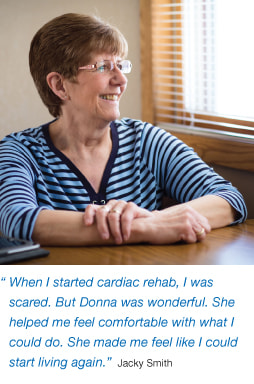Recent Posts
-

-
 Patient StoriesA lifesaver saved: An EMS veteran’s journey from rescue to recoveryNovember 14, 2025
Patient StoriesA lifesaver saved: An EMS veteran’s journey from rescue to recoveryNovember 14, 2025 -

Cardiac rehabilitation helps woman regain strength and confidence after heart surgery

Jacky Smith admits it.
“I’m stubborn,” says the 57-year-old Winnebago resident. “Very stubborn.”
So, when she had shortness of breath and chest pain one day at work, she didn’t listen when her co-worker, and later her husband, urged her to go to the Emergency Department.
But when the symptoms persisted for over a week, Smith finally agreed to call her primary care physician. She then heard some familiar advice — go directly to the Emergency Department. This time, she listened.
Initial tests were inconclusive, so Smith was referred to Durga Komaragiri, M.D., an internal medicine physician at Mayo Clinic Health System in Fairmont, for more testing. Eventually, she was diagnosed with mitral valve regurgitation, a condition in which the heart’s mitral valve doesn’t close tightly. This allows blood to flow backward into the heart, making it difficult for blood to move through the heart and the rest of the body. Shortness of breath is one of the most common symptoms.
Smith was referred to Mayo Clinic in Rochester to correct the problem. She was in good hands — each year, Mayo Clinic cares for more than 17,000 people with mitral valve conditions.
At Mayo Clinic, Smith met with David Joyce, M.D., a cardiothoracic surgeon, who explained that he would first try to repair her valve. If that wasn’t possible, he would replace it.
“I thought I would be scared to death, but I wasn’t,” says Smith. “They made me feel so safe.”
On April 8, 2014, Dr. Joyce repaired Smith’s mitral valve. Five days later, she went home to begin her recovery. She felt tired and weak, but determined.
“Jacky didn’t wait for the recovery process to find her,” says Donna McMurtry, a registered nurse who works in the cardiac rehabilitation program in Fairmont. “She was proactive and made her recovery happen.”
Cardiac rehabilitation was an important part of that recovery. The individualized program helps people recovering from cardiac surgery or heart attacks regain strength and learn how to live a heart-healthy life. Registered nurses guide patients through a supervised exercise program, and also provide education and counseling. Depending on their needs, patients may also see a clinical exercise specialist, counselor, diabetes educator, dietitian, pharmacist, physical therapist or respiratory therapist.
“Research has proven that cardiac rehab helps people recover and helps prevent future heart-related illnesses and death,” says McMurtry. “The program helps people feel better physically and mentally after a heart-related illness.”
Smith says it worked wonders for her.
“When I started cardiac rehab, I was scared,” says Smith. “But Donna was wonderful. She helped me feel comfortable with what I could do. She made me feel like I could start living again.”
Today, Smith is doing well.
She’s back to work and continues the exercise habit she developed in cardiac rehab, walking two miles most days. She says she’s grateful for the care that was there when she needed it most.
“I couldn’t have asked for better care anywhere,” she says. “Thanks to the people who cared for me, my story has a happy ending.”



